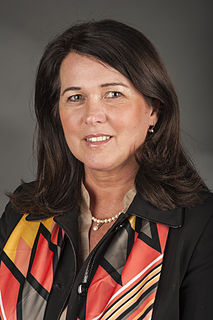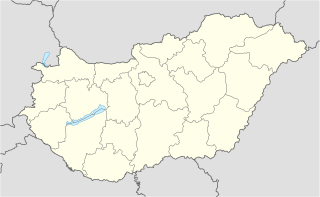
Pál Schmitt is a Hungarian Olympic fencer and politician who served as President of Hungary from 2010 to 2012.

The Movement for a Better Hungary, commonly known as Jobbik, is a Hungarian political party with radical and nationalist roots. At its beginnings the party described itself as "a principled, conservative and radically patriotic Christian party", whose "fundamental purpose" is the protection of "Hungarian values and interests." The party has been described as an "anti-Semitic organization" by The Independent and a "neo-Nazi party" by the president of the European Jewish Congress. Philosopher Ágnes Heller, a Holocaust survivor, says that Jobbik has never been a neo-Nazi party, although she described them as far-right and racist.

László Toroczkai is a Hungarian politician, journalist, leader of the Our Home Movement political party and mayor of Ásotthalom. He is also founding member of the HVIM youth organization, the Hunnia national radical movement and former Vice President of Jobbik. Between 2002 and 2013 he served as editor-in-chief of the Magyar Jelen newspaper.

Parliamentary elections were held in Hungary on 11 and 25 April 2010 to choose MPs for the National Assembly. They were the sixth free elections since the end of communist era. 386 members of parliament were elected in a combined system of party lists and electoral constituencies. The electoral law does not allow all adult citizens to stand for being elected unless they can validate 500 signatures of other citizens supporting their candidacy.

Politics Can Be Different is a green political party in Hungary. Founded in 2009, it was one of four parties to win seats in the National Assembly in the 2010 parliamentary election. The party is a member of the European Green Party.

The second government of Viktor Orbán or the Government of National Cooperation was the Government of Hungary from 29 May 2010 to 6 June 2014. Orbán formed his second cabinet after his party, Fidesz won the outright majority in the first round on April 11, with the Fidesz-KDNP alliance winning 206 seats, including 119 individual seats. In the final result, they won 263 seats, of which 173 are individual seats. Fidesz held 227 of these seats, giving it an outright majority in the National Assembly by itself.
Dr. András Cser-Palkovics is a Hungarian politician, member of the National Assembly (MP) for Székesfehérvár between 2010 and 2014. He was a Member of the Parliament from Fejér County Regional List between 2006 and 2010. He is the current Mayor of Székesfehérvár since October 2010.
Bodakajtor is part of Aba in the Subregion of Aba, Fejér County, Hungary. It lies 5 kilometer North West from the center of the village. There is a community house in this part of the village.

The European Parliament election, 2014 for the election of the delegation from Hungary to the European Parliament was held on 25 May 2014.

Dr. Bernadett Szél is a Hungarian economist and politician, and has been a member of the National Assembly (MP) since 2012. She was co-President of the Politics Can Be Different party from 2013 to 2018, and its candidate for the position of Prime Minister during the 2018 parliamentary election. Following internal conflicts, she resigned as co-chair in August 2018, and subsequently also left the party in October 2018.
Hungarian local elections were held in Hungary on October 12, 2014. It was the first local election according to the new Constitution of Hungary which went into force on 1 January 2012. The new electoral law entered into force that day.

Zsuzsanna Szelényi is a Hungarian psychologist and politician, Member of the Parliament (MP) from 1990 to 1994 (Fidesz) and since 2014.

The 2014 Hungarian parliamentary election took place on 6 April 2014. This parliamentary election was the 7th since the 1990 first multi-party election. The result was a victory for the Fidesz–KDNP alliance, preserving its two-thirds majority, with Viktor Orbán remaining Prime Minister. It was the first election under the new Constitution of Hungary which came into force on 1 January 2012. The new electoral law also entered into force that day. For the first time since Hungary's transition to democracy, the election had a single round. The voters elected 199 MPs instead of the previous 386 lawmakers.

Palé is a village in Baranya county, Hungary.

The General Assembly of Budapest is a unicameral body consisting of 33 members, which consist of the 23 mayors of the districts, 9 from the electoral lists of political parties, and the Mayor of Budapest. Each term for the mayor and assembly members lasts five years.

The 2018 Hungarian parliamentary election took place on 8 April 2018. This parliamentary election was the 8th since the 1990 first multi-party election and the 2nd since the adoption of a new Constitution of Hungary which came into force on 1 January 2012. The result was a victory for the Fidesz–KDNP alliance, preserving its two-thirds majority, with Viktor Orbán remaining Prime Minister. Orbán and Fidesz campaigned primarily on the issues of immigration and foreign meddling, and the election was seen as a victory for right-wing populism in Europe.

The National Self-Government of Germans in Hungary is the nationwide representative organization of the German minority in Hungary.

Erk is a village in Heves County, Northern Hungary Region, Hungary.
Fidesz–KDNP Party Alliance, formerly also known as the Alliance of Hungarian Solidarity is a right-wing national conservative political alliance of two political parties in Hungary, the Fidesz – Hungarian Civic Alliance (Fidesz) and the Christian Democratic People's Party (KDNP). The two parties jointly contested every national elections since the 2006 parliamentary election. The Fidesz–KDNP party alliance has governed Hungary since 2010, altogether obtaining a two-thirds majority in each 2010, 2014 and 2018 national elections.

Pély is a village in Heves County, Hungary.

















